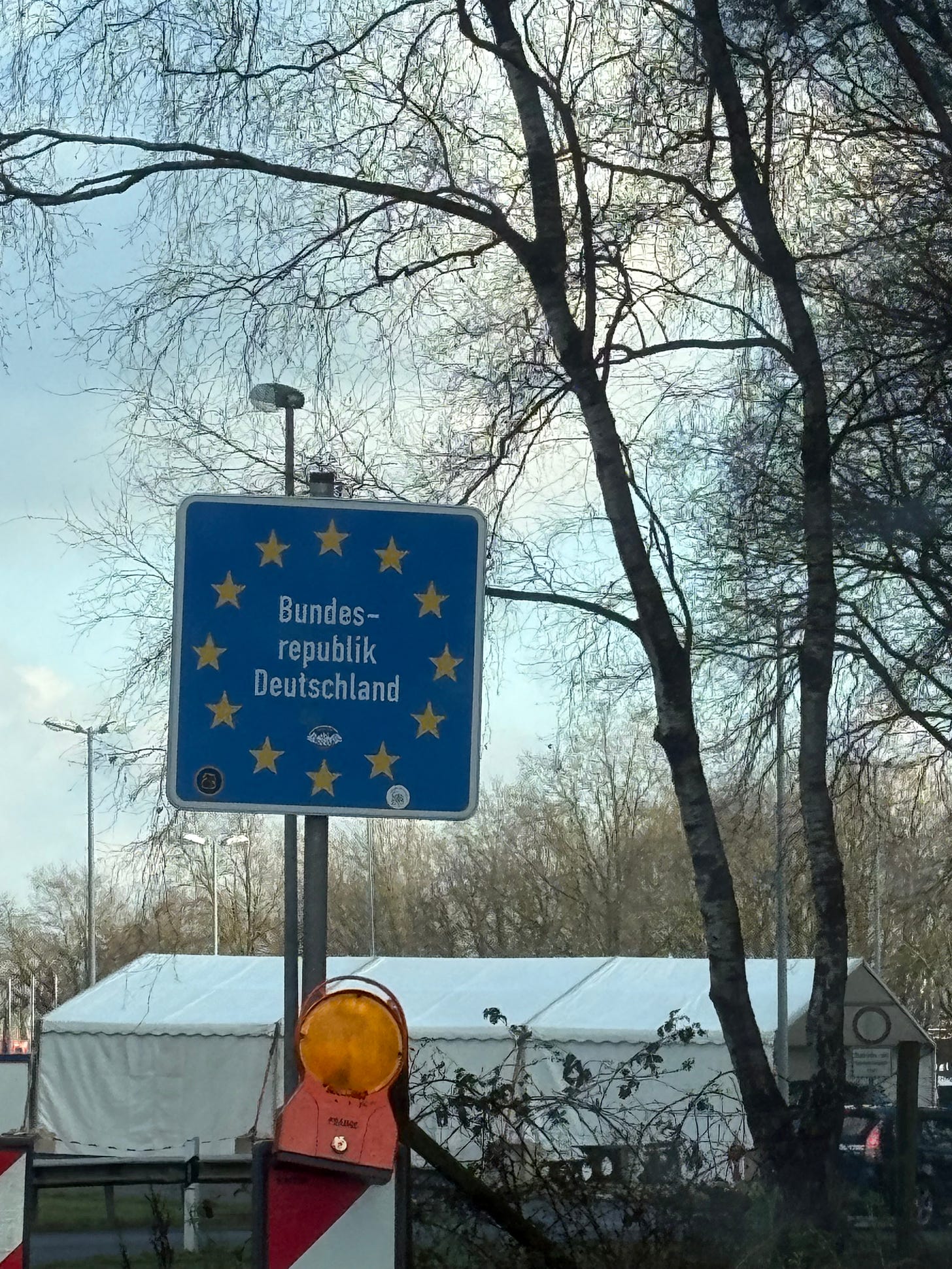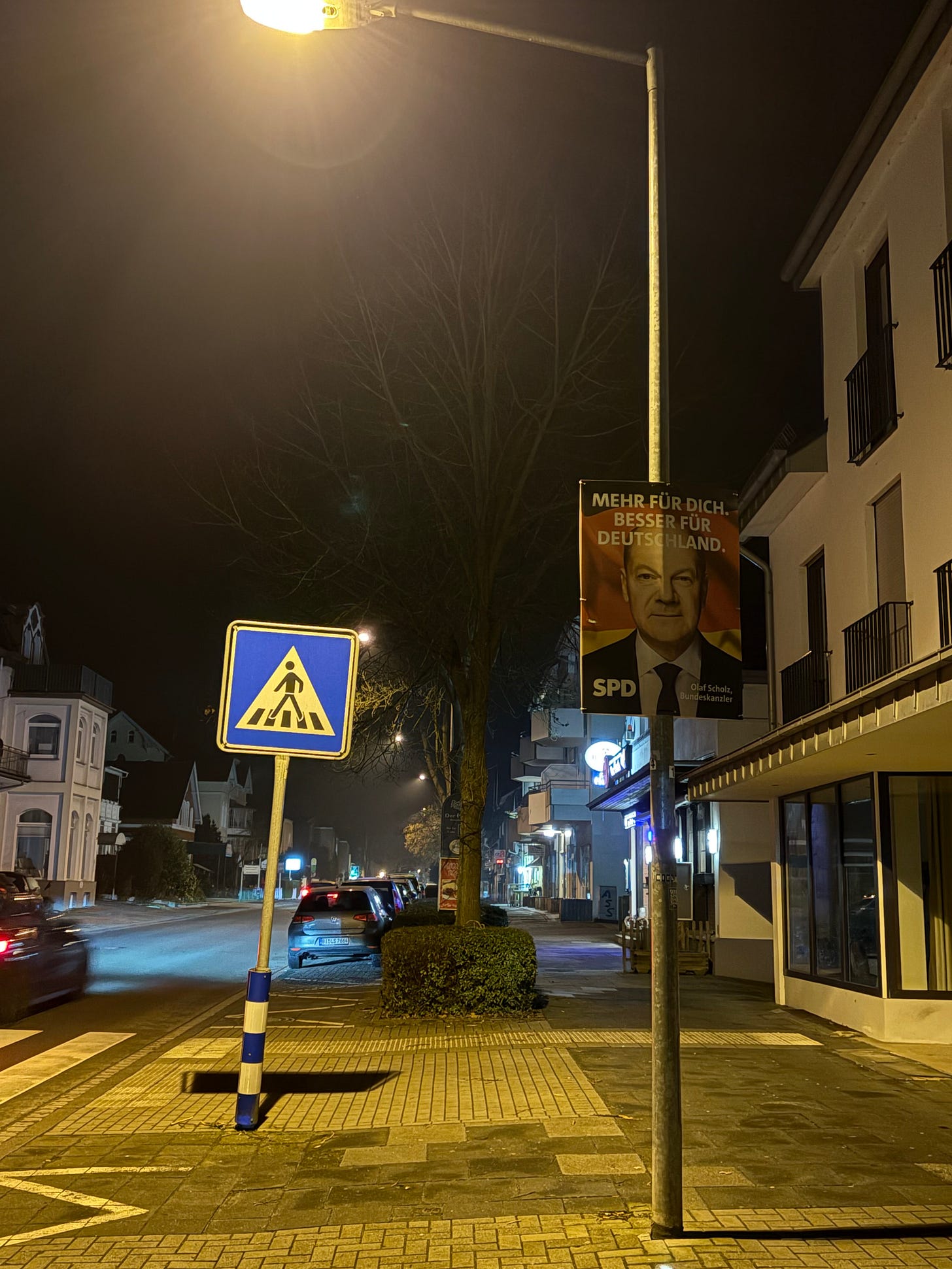Checkpoint Germany (Part I: When borders close again)
The first of a two-part series on my recent trip to Germany—on borders, memory, and the fault lines of history.
This is my first trip to Germany in winter since I moved to the U.S. fifteen years ago. Before I left, my kids made sure I packed a swimsuit. To them, the sun is always shining here because we only visit in the summer. They don’t know that the weather in February alone is enough reason to emigrate—the low, heavy clouds press down until the dampness seeps into your bones and never leaves. I wouldn’t have chosen to return now, but grief has its own itinerary. Although my friend Tine disliked winter in Germany more than anyone I knew, this is where she spent her final weeks. But then, the friend I lost was different from the friend I knew, just as the country I return to isn’t the one I left. Grief has a way of making everything feel out of place.
On my first day back, the sun was shining and the past came rushing in. During the three-hour drive from Amsterdam to my hometown in Germany, border agents stopped us—for the first time in more than thirty years. As they inspected our car, I was suddenly six years old again, remembering another border stop, another tense crossing. It was one of our last trips as a family, traveling between East and West Germany. I stared out the car window at the barbed wire fences, trying to spot the kennels of the “cute” barking German shepherds, while silently willing away the urgent need to use the bathroom. “We can’t stop for the next hour,” my father had warned as we passed the last village before the heavily patrolled border. Right on cue, I had to go—but I didn’t dare say a word.
At the checkpoint, I squeezed my mother’s sweaty hand as border agents stripped our car. After what felt like hours, one of them walked off smiling, carrying the bag of potatoes we had brought for our family in the East—to plant for the next season. That story became part of our family history, a constant reminder of what borders can take: sustenance, dignity, family. For me, it was the beginning of the lasting erosion of my family, first divided by a wall, then fractured by reunification—our relatives in the East humiliated by the terms of their "return," those in the West resenting the lack of gratitude.
Stopped at another German border some thirty years later, I felt grief for more than a friend. The continent I never wanted to leave had accomplished the longest-lasting peace in its history with the free movement of people and goods across borders—only to be put in reverse. Two days earlier, for the first time since World War II, a far-right majority in the German parliament—made up of the Christian Democratic Union (CDU), Germany’s equivalent to the moderate wing of the U.S. Republican Party, and Alternative for Germany (AfD), an extreme nationalist, Nazi-sympathizing party—had voted to effectively close all borders to asylum seekers. The measure wasn’t binding; Germany’s government, having lost its governing majority last November, is now in legislative limbo. No new laws will be passed or big decisions made before the upcoming general elections later this week.
Symbols have great power. The statement of the German Parliament was enough for border agents to search every car. They quickly profiled my friend and me—two white German women—before carefully searching the backseat and waving us through. They weren’t looking for potatoes.
In the days that followed, tens of thousands of Germans took to the streets in protest of the vote. By the time I reached Munich a week later the crowd had swelled to 250,000.
“We have been here before,” a forty-something protesting father of three told the evening news. The five-year-old on his shoulders held a hand-painted sign: “1933: Never again” in large black letters. It referred to the fateful year Adolf Hitler became German chancellor—without having won a majority—because the established political parties underestimated his greed for absolute power. Polls now show the AfD poised to become the second-strongest party in the German parliament this Friday.
The last time I was stopped at a border in Germany, the country was divided by a wall. Now, it is divided again—by ideology, by fear, by the question of who belongs and who does not. The ghosts of history linger, not just in memories of barbed wire and checkpoints, but in the growing crowds demanding we remember what happens when borders harden and doors close. Where there is grief, there is defiance, and eventually, hope. In the next issue, I will follow the tracks of an almost-forgotten Nazi resistance fighter whose defiance led me from the Swabian Alps to Munich and Dachau, one of the last concentration camps liberated by the U.S. Army eighty years ago.
Auf bald,
Eva




